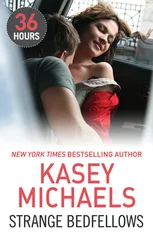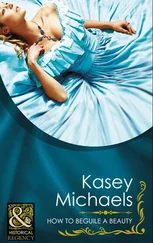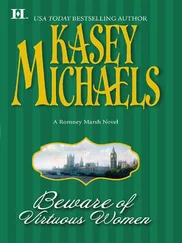“Yes, of course,” he said, smiling in a way that made her itch to slap the smile from his face. “Exactly as I thought.” He offered her his arm once more, and he felt suddenly distant from her, even as he walked beside her….
“YOU’RE NOT AFRAID OF HIM?” Lady Whalley looked at Fanny in some shock, then gave a dismissive wave of her hand as she settled back onto the satin settee she’d earlier sworn had been fashioned by sadistic foreign devils intent on bruising her poor bottom with their outlandishly uncomfortable design. “Oh, you’re only saying that to build your own courage. Everyone is afraid of Valentine, most especially of his horrid tongue, always so cutting. And that’s just the way he likes it. What’s worse, Fanny, he absolutely revels in their fear. The great, unapproachable Brede. My stars, if I wasn’t his sister, I’d cut a wide path around him myself, I vow it.”
Fanny was barely listening to the woman. She’d taken Brede’s advice, for the most part, and had spent the past two days pleasantly smiling, and nodding, and allowing herself to be guided into gowns, slippers, pelisses, cloaks and several yards of satin ribbon she had no use for at all—although she felt fairly certain Lucie did, and delighted in the fact that all the bills would go to her brother.
Besides, Fanny didn’t want to hear about the Earl of Brede. She wanted to see him, demand that he take her to see Rian. Rian would have come to her if he could, so obviously he couldn’t, which meant she would go to him. Ladies were riding out to the various encampments every day in open carriages, picnic hampers tucked on the facing seat, parasols held high to keep off the warm June sun.
“Are you sure, Lucie,” she asked, turning away from the window overlooking the street, where she encamped herself as often as possible, “that you don’t wish to ride out to see the troops parade? I’m sure it would be great fun—and you could show off your new bonnet?”
Lucie had lifted her small feet up and onto the settee as she lay back against at least a half-dozen cushions commandeered from every corner of the rented house. “Well,” she said, dragging out the word, “I suppose we could. Except—no, Valentine forbade it. He left me very distinct written orders. You are to remain here until he returns. And it hasn’t been so long, only yesterday and today. Although I agree, an afternoon can seem a week long, when there’s no gaiety. Alas, this is a house of mourning, drat William.”
Fanny took up a seat at the very edge of a chair placed across a low table from the settee, her hands on her knees, about to demonstrate to Lucie the sort of logic that had the rest of the Beckets sighing over her with regularity. “He said I had to remain here. Ah, but where is here, Lucie? Here, as in this house? I don’t think so, because we did go out shopping all day yesterday, didn’t we? Or did he mean here, as in Brussels? Or even here, as in Belgium itself? There are so many definitions of here. He should have been more clear, don’t you think? It wouldn’t be your fault that he wasn’t more specific, now would it?”
Then Fanny arched her brows, watching the gears begin to turn in Lady Whalley’s pleasant but limited brain.
Lucie sat up, sliding her feet to the floor once more. “My stars, yes! He should have been more specific, shouldn’t he? That was very lax of him, wasn’t it? Exactly where is here?”
“I suppose he simply thinks you should moulder here, like some warden watching her prisoner,” Fanny said, blinking several times in baffled innocence as she turned the screw. “And why he should punish you, his dear and loving sister? Why, it passes beyond my imagination, it truly does. Your brother seems to have no consideration for you. Some—not you or I, of course—might even call him a selfish brute.”
Lucie drew up her features in a scowl, and then rose quickly, her spine straight, and began to pace. “Yes, the brute! How dare he? Giving me orders, as if he was Wellington himself. My stars! The whole world is here, enjoying the fun, and here I am, wardening a perfectly rational young woman who is at least presentable now, no thanks to him, but thanks to me. And what is my reward? I’m supposed to just sit here…sit here…”
“Twiddling your thumbs?” Fanny suggested helpfully, then winced, fearing she may have overplayed her hand.
But, with Lady Whalley, Fanny would not only have to overplay her hand, she’d probably have to write on the nearest wall, in foot-high letters: I’m leading you down the garden path, madam.
“Yes! Yes, that’s it—twiddling my thumbs,” Lucie said, tugging on the bell pull. “The nerve of that man! Fanny, run upstairs and have Frances bring me my things. We’re going out!”
Fanny all but flew up the stairs to alert the maid and fetch her new bonnet—a lovely thing, all buttery-yellow straw, and with cherries on the brim—and was back in the hallway before skidding to a halt, remembering her gloves and shawl, and skidding back into the small bedchamber to retrieve them. Seconds later, and only slightly out of breath, she was descending the stairs in a most ladylike-Elly fashion, a refined young miss about to take the air.
Frances came huffing and puffing from the rear of the narrow hallway, having had to negotiate the steep servant stairs, and the carriage was waiting for them in the street.
Fanny kept looking to her left and right, sure Brede would show up somehow and ruin all her fine plans, but the carriage, a pretty thing of foreign make, with its leather top folded down so that she and Lucie were sitting in the sun, moved off toward the wide avenue at the corner.
“You forgot your parasol,” Lucie scolded as Frances, commandeered to ride along, unfurled Lucie’s and held it over her head. “Are you going to make me order the roof put up? Oh, stars, I hope not. Nobody’s seen my new bonnet as yet, you know.” She frowned. “I don’t know that I should have let you have that one. I do like those cherries. Perhaps even more than my silk roses. I’m just so glad William’s gone six months now and I can wear my lavenders, too. Black is so boring, although I will say I do believe it flatters me.”
Fanny smiled and nodded, and Lucie kept on talking, when she wasn’t waving at passersby and then making quiet comments to Fanny. “Did you see her cane? My stars, does she think wrapping it in satin ribbon will make anyone forget she’s older than dirt? Oh, look, isn’t that the Marquess of Daventry? Yes, yes, it is! And doesn’t he look marvelous in his uniform? So handsome. Yoo-hoo—Banning!”
“I don’t think he heard you, Lucie,” Fanny said, biting on the insides of her cheeks, as the man had most definitely heard Lady Whalley, and seen her, but he’d then made a quick business out of stepping into a nearby shop rather than speak to her. She could be wrong in her conclusion, but she was fairly certain that fine London gentlemen did not make it a habit of frequenting corsetiers. Lady Whalley could talk the ears off a donkey, and if she, Fanny, saw a handy corset-makers shop, she might duck into it, too, poor man.
“Well, that is too bad. He’s single, you know, and quite wealthy. Although cut much in the same pattern as Valentine, so he most probably would feel the need to throttle me within days of the wedding. Oh, well,” Lucie said, sighing, “there are so many other lovely men to choose from. Valentine says I should be on the lookout for a deaf one, but he was just being facetious….”
Fanny bit the insides of her cheeks once more, nodded, and then pretended a great interest in her surroundings as Lucie prattled on and on about nothing.
Not that she had to feign interest for long, for Brussels was quite the largest city she’d ever seen, and full of things to look at, admire. Several times she saw scarlet-jacketed soldiers traveling in groups down the flagway, but none of them walked with that certain elegance and grace that came so naturally to Rian.
Читать дальше












